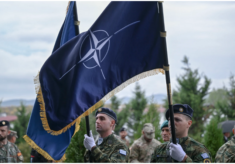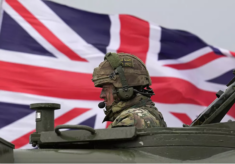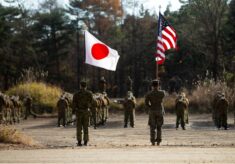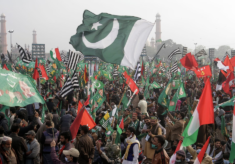Prior to analysing the more technical, geopolitical, diplomatic and strategic aspects of last week’s standoff in the Sea of Azov between Kiev and Moscow, the recent Kerch crisis tells us immediately and above all three things.
Firstly, that the Ukrainian crisis is still the central and most crucial one in the already strained relations between the Euro-Atlantic community and the Russian Federation. In fact, if a serious military conflagration between superpowers should theoretically break out today, three possible epicentres would be Syria, the South China Sea and indeed Ukraine.
Secondly, it points out how the progressive decrease in media coverage of the crisis in eastern Ukraine (and its marginalisation by the international community as well) proved not only to be useless, but even counterproductive.
Thirdly, it once again highlighted, as if there was any need, Europe’s growing security problem.
Regarding the Azov Sea region, for those who have basic knowledge of the secular history of the region’s geopolitical dynamics, conflicting military efforts to expand one’s own influence on these coastal strips are nothing new. The strategic area of the Sea of Azov and its coasts (in the broader geo-strategic framework of the Black Sea) have in fact been disputed across time immemorial. Since the times of the barbarian invasions by the Huns and Avars, from being the object of contention in the 17th and 18th century between the Russian empire of Peter I and of Catherine II against the Ottoman Empire, back then embodied by its Tatar proxies.
In fact, this has been the geographical cradle from where the Eastern Question was formed and then notoriously developed in the nineteenth century, and where the Ottoman empire’s first cracks became visible, slowly turning it into the sick man of Europe. That is history, this mysterious object for too many decision-makers. Today, in place of the Turkish Empire there is the much more fragile Ukrainian state; after all, though, the dynamics of the dispute are not drastically different from the time of the clashes between the Tsar and the Sultan.
The importance for Moscow of the coastal strip of the Sea of Azov is in continuity with the unilateral annexation of Crimea: historical memory and strategic imperatives, again, run on parallel tracks. In Crimea it was the naval base of Sevastopol, today – after connecting mainland Russia to the peninsula through the Kerch strait – the plan could be to extend Russia’s influence up to Mariupol and even Odessa, realizing therefore the initial tsarist-era project of so-called Novorossija. Should this become a reality, it would definitely turn the Sea of Azov into a Russian lake. The stakes for the control of the Azov sea are huge, as they were in the case of Crimea, or even more.
The stakes are high even on a more purely theoretical level, namely that related to international maritime law: recently in the Foreign Policy pages, James R. Holmes, chair of maritime strategy at the U.S. Naval War College [https://foreignpolicy.com/2018/11/29/goodbye-grotius-hello-putin-russia-ukraine-sea-of-azov-kerch-strait-south-china-sea-unclos-law-of-sea-crimea/], argues on how Moscow’s actions in the Kerch Strait are similar, or in the least comparable, to those of the People’s Republic of China in the Pacific. Different geopolitical dimensions are adding up and intersecting in a crisis that seems endless and constantly evolving. and they are expanding at an ever-increasing rate. From Ukraine’s internal issues, with the crucial presidential elections theoretically scheduled for 31 March 2019, to energy issues, in relation to possible plans to slow down or even stop the aforementioned North Stream II, to the broader political-trade issues between the Euro-Atlantic community and Russia, in which the Kerch Strait crisis could constitute a casus belli for the continuation – or even the stiffening – of the sanctions regime that will certainly not do well for the already not-so flourishing Russian economy.
How to proceed? European diplomacy – or rather, the diplomacy of its most important member states, namely France and Germany – must reaffirm the centrality of the Minsk II agreements, make sure to avoid any accidents on the ground (rather, in the sea) that could result in great turmoil, and avoid a further erosion of Kiev’s territorial integrity.
A further Russian territorial expansion towards Ukraine, through a possible incorporation of Ukrainian (coastal) lands, even if enticing from a historical and geopolitical standpoint, could actually turn out to be indigestible and unwelcome for Moscow too. For two main reasons. The first one is economic: the annexation of Crimea alone has in fact already weighed heavily on the Russian state coffers, and with the price of oil under €60 a barrel, it is unlikely that Moscow would be willing to bear further heavy costs that another annexation would entail. The second question concerns the political identity orientation of these particular Ukrainian areas: in fact, these territories, although partially Russophones, have a decidedly less compact pro-Russian sentiment than the Crimean peninsula.
In conclusion, the latest events do not bode well for the foreseeable future: the imposition of martial law in ten south-eastern regions of the country and a ban on Russian men aged 18 to 60 to entry the country decided by Ukrainian president Petro Poroshenko, a practical blockade for Ukraine’s navy from entering the Azov Sea, and Kiev’s navy vessels and sailors still detained by Moscow. Unfortunately, also at the G-20 in Argentina the opportunity to find some kind of temporary agreement for a serious de-de-escalation was not reached. Trump and Putin though, the two supreme regulators of the dynamics of the Ukrainian conflict, despite the cancellation of the scheduled bilateral summit, managed to have a brief encounter on the margins of the G20 in Buenos Aires. As usual when it comes to their mysterious face-to-face meetings, the contents of their talks is yet to be released.
Furthermore, the Kremlin’s foreign policy aide Yuri Ushakov met with the US national security adviser John Bolton, and stated that the two countries were ready to continue contacts. Evidently, the main discussion concerned the Kerch strait issue. Other top diplomatic figures made their voice heard about the situation in Ukraine. Turkish President Erdogan, who is as well most likely mindful of the historical role played by the Ottoman Empire – the same empire that his political project would like to resurrect – expressed words of moderation hoping that the sea of Azov will soon turn into a sea of peace. Besides this irenic wish, Erdogan’s statements are more understandable through realist, pragmatic lenses. In fact, for Ankara, the Black Sea region is – and will progressively be in the upcoming years – an area of state’s projection, where, as pointed out on the Center for Strategic and International Studies pages [https://www.csis.org/analysis/turkey-has-no-allies-black-sea-only-interests], Turkey has no allies, but only interests; among which the control of the Turkish Straits.
Other declarations in the spirit of de-escalation came from Ursula von der Leyen, the Foreign Minister of Germany – the state that most supported Ukraine in the post Euromaidan era – who urged Moscow to release Ukrainian sailors, but who stated as well how crucial it is to avoid any militarisation of the conflict. Germany’s government, evidently unwilling to spoil in any way the contested North Stream II gas pipeline, also turned down Poroshenko’s request to send naval support in the Azov Sea in relation to the current standoff with Moscow.
During the Cold War, the old refrain of NATO strategic thinking was strategy rules policy: has it now turned into energy rules policy? The Italian Foreign Ministry and OSCE chairperson-in-office Enzo Moavero Milanesi, also stressed the need for both parties to de-escalate the crisis. Moreover, Italy – given its traditional good relations with Moscow, while being a reliable and committed Atlantic Alliance member – could gain a stronger diplomatic status and weigh with regards to the situation in Ukraine, since in 2018 it holds OSCE’s rotating Chairmanship. Indeed, The Organization for Security and Co-operation in Europe, played a key multilateral diplomatic role in Central and Eastern Europe’s geopolitics, and so far proved to be able to mediate between Ukraine and the Russian Federation even in the most critical circumstances. In such a complex and unpredictable European as well as global scenario, Rome should definitely make the best out of this prestigious and relevant 2018 OSCE chairmanship and further establish its traditional, historical diplomatic-power broker status. What better platform to start than the OSCE’s next Ministerial Council which is going on, under Italy’s chairmanship, these days in Milan?
Giorgio Cella – PhD at Catholic University of Milan





























